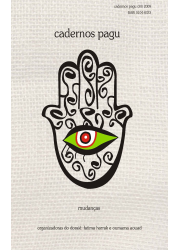Abstract
Falar do longo processo de mobilização nacional pela reforma do código da família no Marrocos exige que se preste homenagem aos primeiros militantes, homens e mulheres, pela emancipação das mulheres. Desde os anos quarenta, esses pioneiros colocavam entre suas reivindicações a abolição da poligamia, o estabelecimento do divórcio judiciário e os direitos iguais para as mulheres no interior da família. Os líderes do movimento de reforma Salafiya no Marrocos, entre eles Allal el-Fassi, estiveram entre seus inspiradores. De fato, a evolução da condição das mulheres marroquinas no início do século XX deu-se sob a dupla influência, por um lado, das novas condições sócio-econômicas e culturais resultantes da colonização e, por outro lado, através das idéias-chaves do reformismo muçulmano (Salafiya), difundidas pelos movimentos nacionalistas nas quais se inspiravam. Este ensaio é um convite para que se conheça a contribuição desta corrente e, em particular, a contribuição de seu líder, Allal el-Fassi, à evolução da sociedade marroquina moderna e à ascensão das mulheres marroquinas durante a primeira metade do século XX.
Abstract
To talk about the long process of national mobilization for the reformation of the Moroccan Family Code means also to talk about to the first fighters for women’s liberation, both men and women. Since the 1940s, these pioneers asked for the abolition of polygamy, the establishment of judicial divorce and equal rights for men and women in the family circle.The Salafya movement leaders, among them Allal el-Fassi, were the inspiration for it. Two main factors were of importance for the evolution of the position of Moroccan women at the beginning of the 20th century: one, the new socio-economic and cultural condition obtained through colonization, and, two, the key ideals of Salafya (Muslim Reform), spread by the nationalist movements which were an inspiration for them. This article is an invitation to the introduction of this chain of thought and, particularly, to the contribution of his leader, Allal el-Fassi, to the evolution of modern Morocco and the empowerment of Moroccan women in the first half of the 20th century.
Key Words: Salafya, Muslim Reformation, Moroccan Family Code
References
ABUN-NASR. The salafiyya movement in Morocco. Middle Eastern Affairs, nº 3, Londres, 1963.
AFGHANI. Réfutation des matérialistes. Paris, 1942.
ALISON, Baker. Voices of Resistance: Oral Histories of Moroccan Women.
Albany, NY, SUNY Press, 1998, pp.63-77.
AYACHE. Bilan d’une colonisation. Paris, Ed. Sociales, 1956.
BENABDALLAH, Abdelaziz. Les femmes dans les grands courants de la civilisation du Maghreb. Casablanca, 1958.
BERQUE, Jacques. ça et là dans les débuts du réformisme religieux au Maghreb. Etudes d’orientalisme dédiées à la mémoire de E. Lévi Provençal. Paris, Laros, 1962, pp.471-494.
DAOUD, Zakya. Féminisme et Politique au Maghreb: Sept décennies de lutte. Casablanca, Ed. Eddif, 1996.
EL-FASSI, Allal. Aqida wa jihad (doctrine et action). Rabat, 1960, (Imprimerie de l’Istiqlal).
_________. Al-Harakat al-istiqlaliya fi al-maghrib al-‘arabi. Le Caire, 1948.
_________. Al Naqd al-dhati. Beirut, Dar el Kashaf, 1952.
GAUDIO, Atillo. Allal el Fassi ou l’histoire de l’Istiqlal, Ed. Alain Moreau, Paris, 1972.
GIBB, H.A. Les tendances modernes de l’Islã. Paris, Maisonneuve, 1949.
HARRAK, Fatima. Réflexions sur l’apport de la Salafiya à l’évolution des femmes marocaines – 1930-1953. Memorial de Mestrado sob a direção de Madeleine Rébérioux e René Galissot, Université Paris VIII, 1975.
HOURANI, Albert. Arabic thought in the liberal age. London, Oxford, 1972.
LACOUTURE, Jean et Simone. Le Maroc à l’épreuve. Paris, Seuil, 1958.
LAOUST, Henri. Le réformisme orthodoxe des salafiyya et les caractéristiques généraux de son orientation actuelle. Revue des Etudes Islãiques, IV, 1932, pp.175-224 MERNISSI, Fatima. Beyond the Veil - Male-Female Dynamics in Muslim Society. London, Saqi, 1985, pp.109-110.
MOUNIRA, M. Charrad. States and Women’s Rights: The Making of PostColonial Tunisia, Algeria and Morocco. Berkeley, Univ. of Calif. Press, 2001, pp.159-161.
REZETTE, Robert. Les partis politiques marocains. Paris, Cahiers de la Fondation Nationale des Sciences Politiques, 1955.

